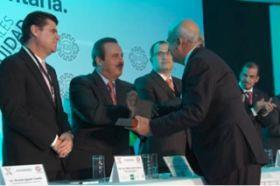
The second international forum for food safety organised by quality label Mexico Calidad Suprema (MSC) in Mexico City on 28 February welcomed delegates from the US, Canada, Chile, Germany, South Africa, Kenya and New Zealand as well as the host country.
The issues of the day included consumers’ evolving habits and speakers at the forum warned that supply-chain players not prepared to change would be left out.
Producers and exporters are also increasingly demanding protocol agreements from their governments, believing there is no point meeting local market requirements if these differ from those expected of them in export destinations.
Arturo Jessel, global trade and investment advisor to Greenberg Traurig, told the forum that with fresh produce exports worth US$18bn annually – and having grown every year since the North American Free Trade Agreement was implemented – Mexican produce must be safe or sendings would not continue running at this level.
Jessel sounded two warnings in his address: food safety protocols should not used as a protectionist measure; and consumers must be better educated about food safety in the home as the majority of food contamination happens in their own kitchens.
He would also like producers to create PR funds for communicating the benefits of their produce and informing the media correctly on food safety issues, thus avoiding expensive media campaigns if a food safety scandal breaks as the Agricola Daniella Mexican mango incident did last year.
Delegates heard from speakers from other countries, with Nuri Grass of Chilean food safety authority Achipia detailing the Chilean food safety experience since the introduction of a national food safety policy in 2009.
Mario Estrada, director of food safety at North American foodservice supply specialist Markon, told the forum that the key to achieving safe food was producer education; that is, telling growers why things are done in a certain way rather that just saying how to do it. Markon has invested considerable funds in a programme that offers resources to help its smaller producer members achieve this.
Luis Araya of IPL Walmart gave the audience his direct sourcing perspective. Such immediate contact with producers enables Walmart to have better control over the food safety of the fruit and vegetables it sources. The main requirements the company looks for in its suppliers are sustainability, ethics, food safety and the establishment of a long-term relationship.
Robert Garfield, senior vice-president at safety certification provider SQF, echoed this when he told delegates: “Food safety is the primary job for any producer. It must be sustainable and producers must not forget that they have a social responsibility."
MSC used the occasion of the forum to sign an agreement with crop protection company BASF to set up a good agricultural practices programme in Mexico using integrated crop and pest management techniques.



